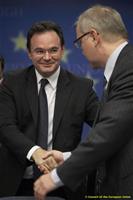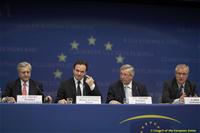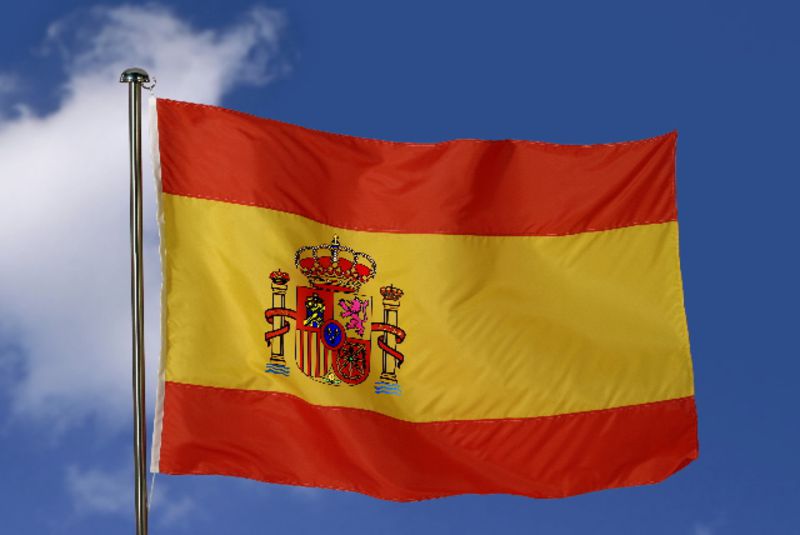The Greek rescue will cost 110 bn euros for 3 years
Ralitsa Kovacheva, May 6, 2010
 The first rescue operation in the eurozone is already a fact. Greece will get financial assistance worth 110 bn euro in the next three years in exchange for reforms and spending cuts. This is written in the agreement the country concluded with the European Commission, the European Central Bank and the International Monetary Fund. The Greeks will make a great sacrifice in order to prevent default, prime minister George Papandreou said in an emotional speech during a cabinet session, at which the deal has been sealed. The session was aired live on TV.
The first rescue operation in the eurozone is already a fact. Greece will get financial assistance worth 110 bn euro in the next three years in exchange for reforms and spending cuts. This is written in the agreement the country concluded with the European Commission, the European Central Bank and the International Monetary Fund. The Greeks will make a great sacrifice in order to prevent default, prime minister George Papandreou said in an emotional speech during a cabinet session, at which the deal has been sealed. The session was aired live on TV.
"Ladies and Gentlemen, we know that these are hard sacrifices, but they are  necessary. This is the only way that we will be able to finance the 300 billion Euros debt we have. If we do not finance this debt, Greece will go bankrupt".
necessary. This is the only way that we will be able to finance the 300 billion Euros debt we have. If we do not finance this debt, Greece will go bankrupt".
On Sunday evening the euro area leaders gathered urgently together to approve the agreement. In a statement the Eurogroup says that it will ensure two thirds of the financing and the IMF - the rest one third. The money will be allocated, accompanied with tough conditions, based upon a programme, agreed by the Greek government, the Commission, the ECB and the IMF. The Fund will ensure 30 bn euros in a 3-year standby agreement. Eurozone's share is 80 bn euros which Greece will receive in the form of bilateral loans with euro area's member states. The interest, as already agreed, will be around 5%.
In exchange to the assistance of the Commission and the IMF, Greece is undertaking new measures, aimed at cutting another 30 bn euros budgetary spending in the next 3 years. The final goal is the budgetary deficit to drop below the 3% limit as foreseen in the Stability and Growth Pact. Currently Greece's fiscal deficit is 13.6%. Almost the entire burden will fall upon the state officials and the pensioners, Papandreou admitted:
"What is positive is that employees in the private sector are not affected. We have had, however, to take additional painful measures which affect pensioners and civil servants because the ‘sick man’ is the public sector and the sooner we change it the faster we will revive our economy and regain lost ground being yielded by Greeks today".
The measures also include freezing of the public sector wages until 2014. The 13th and 14th salary will be removed for officials with over 3,000 euro monthly payment and the rest will be limited to 1,000 euros. All bonuses for budgetary employees, which have already been reduced, will be again be cut with another 8%. It is curious however, that the bonuses were cut now, although the government is fighting for months to control the quickly growing deficit.
The pensions will be reduced and the pension age, which is currently 65 years for men and 60 for women, will be bound to the average life expectancy. The minimal security length of service for pensions will be increased from 37 to 40 years by 2015 (meaning that people will have to work more).
VAT will be raised from 21 to 23% and the excise over fuel, tobacco and alcohol is increased by 10%. The government will spend additional 17 bn euro in support of banks' liquidity. In consultation with the IMF, the Commission and the ECB will establish an independent fund for financial stability that will help banks in need.
According to the plan Greece will have to reduce its fiscal deficit from 13.6% of its GDP last year to 8.1% this year, 7.6% in 2011 and 2.6% in 2014. Public debt will reach its peak of 149% in 2013.
 Prime minister Papandreou underlined that without European help, country's problems would have become unsolvable. Now the question is the country to return confidence:
Prime minister Papandreou underlined that without European help, country's problems would have become unsolvable. Now the question is the country to return confidence:
"Our first concern was to regain credibility with our citizens. We have been honest from the very first moment with the Greek people. A second objective was to regain credibility internationally and chiefly with Europe, because in October 2009 nobody would listen to us. Nobody would believe us. We have struggled to this end because we knew that without credibility we would find no understanding - let alone support."
In a joint statement the Economic and Monetary Affairs Commissioner Olli Rehn and the IMF director Dominique Strauss-Kahn expressed their support for the economic programme of the Greek government:
"To be successful, the program will require a national commitment that goes beyond political party lines. The support from European countries, the European Commission and the European Central Bank, and the IMF demonstrates a very high level of external commitment --and attests to the goodwill for Greece from the international community. Our collective effort will also contribute to the stability of the euro and will benefit all of Europe".
The president of the European Council Herman van Rompuy welcomed the agreement and expressed confidence that "this solid and ambitious programme would give Greece a possibility to put its economy and finances in order, as well as its competitiveness".
Rompuy recalled that in the next days the agreement must be approved by euro  area members' parliaments and invited the 16 leaders to gather again on May 7. In some member states it is necessary such a loan to be approved by Parliament or a special legislation to be approved for the Greek assistance. The situation is especially tense in Germany, where resistance against helping Greece is especially strong and on May 9 there are local elections. The expectations are by May 7 all procedures to have ended and the money to be allocated to Greece. The first tranches of the assistance must be available for Athens by May 19 when a deadline on a debt expires.
area members' parliaments and invited the 16 leaders to gather again on May 7. In some member states it is necessary such a loan to be approved by Parliament or a special legislation to be approved for the Greek assistance. The situation is especially tense in Germany, where resistance against helping Greece is especially strong and on May 9 there are local elections. The expectations are by May 7 all procedures to have ended and the money to be allocated to Greece. The first tranches of the assistance must be available for Athens by May 19 when a deadline on a debt expires.
 | © European Commission- Audiovisual Service
| © European Commission- Audiovisual Service | © Eropean Commisson-Audiovisual Service
| © Eropean Commisson-Audiovisual Service Klaus Regling | © Council of the EU
Klaus Regling | © Council of the EU Mario Centeno | © Council of the EU
Mario Centeno | © Council of the EU Mario Centeno | © Council of the EU
Mario Centeno | © Council of the EU Angela Merkel, Emmanuel Macron | © Council of the EU
Angela Merkel, Emmanuel Macron | © Council of the EU Benoit Coeure | © Council of the EU
Benoit Coeure | © Council of the EU Pierre Moscovici | © Council of the EU
Pierre Moscovici | © Council of the EU | © euinside
| © euinside